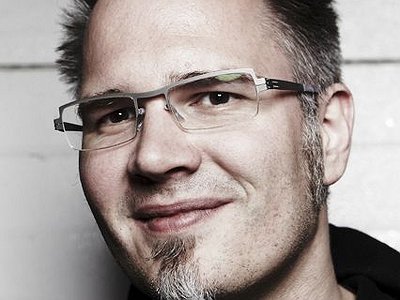Music in mind
Inventor, composer, guitarist and producer, Austrian based musician Markus Reuter can turn his hand to many musical endeavours. Starting out as a pianist then turning to strings of a different kind, Reuter took his Fripp school technique to the limit. He became a master of touch guitar to the extent that he even designed his own instrument in collaboration with luthier Ed Reynolds. Reuter now prefers his U8 Touch Guitar, and can be heard playing it as a solo artist or with his various collaborators including Ian Boddy, Robert Rich and Lee Fletcher. Most recently, next to his ongoing involvement with beyond-categories instant-composition collective centrozoon, Reuter joined Tony Levin and Pat Mastelotto to play in the trio Stick Men and has contributed to the cannon of modern classical with the compelling Todmorden 513. Reuter is currently trying to help raise funds via Pledgemusic.com to suport the Colorado Chamber Orchestra's world first recording of Todmorden 513
When did you start composing - and what or who were your early passions and influences?
I started composing around the age of 11 or 12. My first very early influences were the Beatles, music of the '70s - my mother used to listen to the radio a lot - and then in the early '80s the music of Mike Oldfield, David Bedford, Johann Sebastian Bach, Olivier Messiaen, David Torn, Robert Fripp and King Crimson.
What do you personally consider to be incisive moments in your work and/or career?
At this moment I'd say the incisive moments are meeting my teachers and musical partners. Starting with hearing Mike Oldfield's music live in 1982, working on composition with my piano teacher Ulrich Pollmann, meeting Robert Fripp, Gerd Lisken, Daniel Schell, Ashok Pathak, and my long-term musical partners like Bernhard Wöstheinrich, who keep challenging me.
What are currently your main compositional challenges?
The main challenge really is to find the time to concentrate on composition. Having said that, I believe that a lot of my creative work happens naturally in my head as time passes, the only part of it that actually "takes" time is to write the music down.
What do you usually start with when composing?
It's usually a necessity, an urge, a feeling. It may be hard to understand, but my music is not really represented as an auditory sensation in my head, I don't hear it, I feel it. I do recognise it when I hear it though, and I have had a couple of instances in my life where I discovered that my music had been realised by another composer.
How do you see the relationship between timbre and composition?
No relationship per se. Composition can exist as a concept only, for example as a written score that is not performed, and in this form it can already be consumed. Just like a concept for performance art can be very fascinating. But once the actual piece is performed, one can not prevent timbre to appear.
I approach musical composition, be it writing my own pieces, or producing somebody else's music in the studio, as an act of synthesising. I'm layering timbres to create a new timbre. I am very interested in sounds integrating with each other, separating parts is an old and boring concept judged by my current interests.
What do improvisation and composition mean to you and what, to you, are their respective merits?
I continue to work with both, and I don't see them separate from each other at all. There are composed improvisations and improvised compositions. It's like living your life: It's a back and forth between the need to be working within known situations and unknown situations, and only the flexibility to respond in an appropriate fashion keeps us alive. Also, for most musicians improvisation is just a sub-set of composition anyway. I am interested in finding the music that goes beyond my taste, and beyond my musical abilities, and so an improviser's state of mind when using deterministic, algorithmic processes is what helps me find and accept the "new".
Do you feel it important that an audience is able to deduct the processes and ideas behind a work purely on the basis of the music? If so, how do you make them transparent?
Music needs to speak for itself, or better, it needs to make the listener speak to him/herself. The process of composition shouldn't matter, not for the listener. It's only important during the creative process. For me, making an analogy between a musical piece and a person helps: You need to spend time with the music/person, knowing the ancestry or any other background info usually only creates prejudice, not understanding.
The relationship between music and other forms of art – such as painting, video art and cinema - has become increasingly important. How do you see this relationship yourself and in how far, do you feel, does music relate to other senses than hearing alone?
To me art in general is about creating a mood, a feeling, an inner dialog of some sort. I think that my music is purely transmitted through the auditory sense, but at least to me it ends up as a feeling inside me always.






